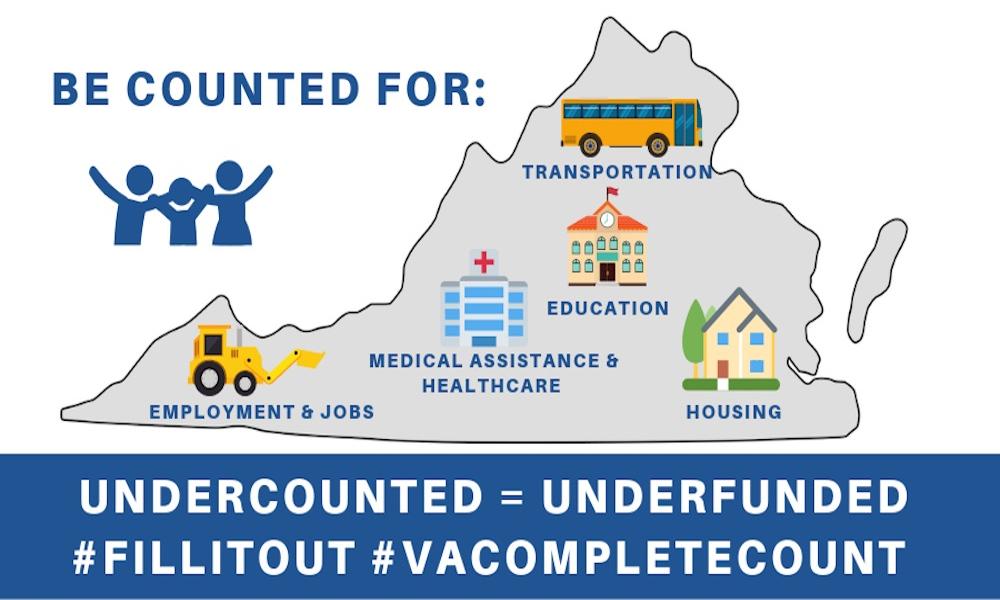Stand up and be counted
JMU active in census outreach and education
JMU in the CommunitySUMMARY: College students are among the groups typically undercounted in the census. The James Madison Center for Civic Engagement is trying to change that.
By Jim Heffernan (’96, ’17M)
OK, Dukes, we’re counting on you.
The 2020 Census, the decennial count of all persons living in the United States, is underway.
And despite changes to the university’s schedule and operations related to the COVID-19 pandemic, the James Madison Center for Civic Engagement is pushing ahead with census outreach and education at JMU.
“We have some pretty big challenges trying to reach everyone online, through text and group chats,” said Carah Ong Whaley, associate director of the Madison Center. “But we see it as an opportunity for our students to lead and be creative in reaching their peers.”
College students, particularly those who live off campus, are traditionally undercounted in the census, in part because they are new to the process and in part because census workers don’t knock on doors until after many students have already left for the summer.
 |
Data from the census is used to draw congressional and state legislative districts as well as school districts and voting precincts. The count also determines how federal dollars will be allocated for community projects such as hospitals, schools and roads as well as government programs like Head Start, Medicare and the Supplemental Nutrition Assistance Program.
“It’s about money and power,” Whaley said. “If people aren’t counted, they’re not going to be represented economically and politically.”
To college students, the census matters because it affects funding for student loans, research grants, campus improvements and more.
The census is also tied to local economic development. Whaley said that a complete count helps ensure that a city like Harrisonburg, with a growing population, will continue to attract industry. “If we want certain businesses to locate here, we need to make sure that our numbers are accurately reflected,” she said.
For every Virginia resident who does not fill out the census, their community will lose $2,000 per year, or $20,000 over a decade.
How students should count
Invitations to fill out the 2020 Census were mailed to all U.S. households in mid-March. This year marks the first time that the census can be completed entirely online, although the Census Bureau will continue to accept responses over the phone and by mail.
Persons will be counted where they reside on April 1 and spend the majority of their time during the year. That means most JMU students will be counted in Harrisonburg.
Even if students are not in Harrisonburg on April 1 because of online classes, they should use their JMU address when filling out the census, Whaley said.
The Office of Residence Life will work with students who live on campus to ensure that they are counted. Students who live off campus should designate one person in their household to fill out the census for everyone. International students studying at JMU in the spring semester also will be counted locally. Commuter students will be counted where they live.
Outreach and education
The Madison Center’s Democracy Fellows have created a student primer on the census. Angelina Clapp, Anna Connole, Ethan Gardner, Kearstin Kimm, Aaliyah McLean and graduate assistant Sarah Gully have also developed a PowerPoint presentation, graphics and videos, which faculty members have been asked to share in their classes.
|
IMPORTANT DATES: April 1: Census Day is observed nationwide. By this date, every home will have received an invitation to participate in the 2020 Census. Once the invitation arrives, you should respond for your home in one of three ways: online, by phone, or by mail. |
Going forward, the Madison Center will focus on online discussions, social media campaigns and webinars to get the word out and encourage participation in the census.
The center has also launched a photo and video competition. Any JMU student who posts a photo or video on social media about why the census matters using #DukesCount will be entered to win $10 in Flex on their JACard.
JMU students will receive a reminder to complete the census when they check in for May Commencement or register for Fall 2020 courses.
Whaley is one of five JMU faculty members who are team-teaching a class this semester on the census. The students enrolled in Democracy Counts—four juniors and four seniors, along with five students who are taking the class as an independent study—are supporting census education and outreach.
Colleges and universities have a special responsibility to the communities where they are located to ensure a complete count, Whaley said.
Non-English-speaking residents are an especially difficult population to reach, a fact that has been exacerbated in this cycle because of the politics surrounding immigration, Whaley said. The 2020 Census does not contain a citizenship question, she said, and all responses, by law, are kept confidential.
The Madison Center is working with the Department of Foreign Languages, Literatures and Cultures to produce census graphics and messaging in multiple languages, and with community organizations like Faith in Action to get census information on weekly church bulletins.
The center plans to put up posters at area laundromats, gas stations and grocery stores—the places most likely to remain open during the response to coronavirus.
The Madison Center also is partnering with K-12 schools in Harrisonburg and Rockingham County to host an art contest encouraging students to create an original work that will help people understand why the 2020 Census matters and why everyone counts.
For more information, go to James Madison Center for Civic Engagement.
###
Read more about why the census matters:
- https://www.forbes.com/sites/civicnation/2020/02/20/if-you-think-voting-is-important-try-the-census/#211f986a14bc
- https://www.rollcall.com/2020/03/27/coronavirus-related-college-closures-complicate-census-count/
- https://www.wsj.com/articles/census-bureau-draws-2-6-million-applicants-for-temporary-jobs-11583359815

